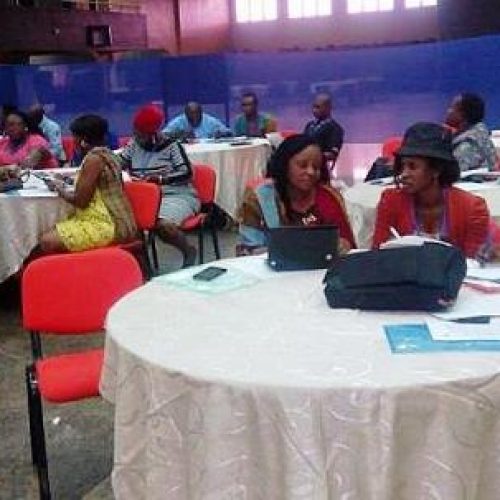Kenyan scientists begin research on use of AI to predict pregnancy risks
A Kenyan Clinician-Scientist, Prof. Moses Obimbo Madadi is currently leading a team of researchers at the University of Nairobi, Kenya in a ground breaking study on how the use of Artificial intelligence (AI) could predict pregnancy risks.
A statement on the study said the researchers are using Artificial Intelligence (AI) and next-generation sequencing technology, to explore how the vaginal microbiome and vaginal infections affect a woman’s reproductive health and pregnancy outcomes.
“Our five-year research project includes screening and monitoring over 1,500 women attending six medical facilities in Kenya over two years. The research follows first, second and third trimester development, with a control group, live births, and women with outcomes of interest such as preterm or stillbirths.
“Having acquired advanced tools such as Polymerase Chain Reaction (PCR) machines to analyse bacteria, and an Illumina MiSeq sequencer for targeted and microbial genome applications, we will use next generation sequencing and AI to analyse microbial communities, and metabolomic profiling to identify predictive and diagnostic signatures of adverse pregnancy outcomes.
“This technology could enable us to identify whether women who deliver at term have a certain microbiome, compared to those experiencing pre-term birth.
“In the third year of our research, we will work with computational biology doctoral students to develop an AI model to analyse the data and develop prediction models that could be used to identify at-risk pregnancies for early interventions. Our aim is to show how differences in the composition in the vaginal microbiome impact pregnancy outcomes.”
Prof. Madadi disclosed that Africa has the highest neonatal mortality rate in the world with 27 deaths per 1,000 live births, adding however that “comprehensive research on the relation between pregnancy loss and reproductive health issues are not as readily available.
“What is known is that vaginal infections, including Sexually Transmitted Infections (STIs), could have serious implications for women’s reproductive health and their pregnancy outcomes. Critical research is needed to better understand the microorganisms present in various vaginal infections, and their role in particular pregnancy outcomes.
“This research is not only the first of its kind in Kenya – it is cutting edge research with significant tangible impact in improving pregnancy outcomes for women around the world. It also informs the development of faster and less invasive testing – such as a urine test – at the point of care, and potentially the development of more effective therapeutic treatments. If health workers can diagnose and treat an infection at the point of care, you mitigate risk to mother and baby, and reduce the cost of treatment.
“Testing for vaginal infections – particularly asymptomatic infections such as bacterial vaginosis – is not routinely carried out in prenatal examinations. Healthcare providers seldom carry out a full screening for both symptomatic and asymptomatic infections. They often do syphilis screening, and screenings in the case of premature rupture of the membranes, but there is no integrated approach for identifying asymptomatic infections.
“Some studies indicate around 20% of women attending gynaecology clinics in Kenya have vaginal infections including bacterial vaginosis and parasitic infections, or STIs including syphilis, gonorrhoea, Chlamydia and Trichomonas vaginalis.
“However, data suggests that as many as 73% of women have asymptomatic vaginal infections. Left untreated, these infections could lead to multiple adverse outcomes for pregnancy and gynaecological health, such as miscarriages, preterm birth, foetal growth restriction, premature rupture of the membranes, stillbirth, and endometriosis or infertility for the mother.
“Early identification and treatment of vaginal infections would reduce the scale of adverse pregnancy outcomes. However, even where screening is carried out for vaginal infections, the process does not always have the desired outcomes, as the usual diagnostic method requires a vaginal swab, which can be seen as invasive and requires follow-up visits to receive the results and get treatment.
“As part of our work, we have established new collaborations with the international Vaginal Microbiome Research Consortium (VMRC), a body which works to improve understanding on the stability of the vaginal microbiota, and risk for disease or adverse gestational outcomes among other functions.”
Prof. Madadi further disclosed that he would form a coalition of researchers and develop tools to study the vaginal microbiome and metabolites during pregnancy to help identify predictive biomarkers and intervention strategies for improving pregnancy outcomes in Kenya.
Noting that Africa carries a high burden of severe pregnancy complications such as stillbirths and neonatal deaths he said he would leverage his broad experience in clinical, basic, and epidemiological research to establish a unique niche of translational research to support the health of women in Kenya and around the world.
“In future, we also plan to drive improved education and awareness of the link between vaginal infections including STIs and pregnancy outcomes. We will sensitise communities and healthcare workers for them to understand that looking out for vaginal infections should be one of the standard pillars of prenatal care.
“By working to identify predictive biomarkers for adverse pregnancy outcomes, we may be able to improve reproductive health for women not only in Kenya, but around the world, and support health officials with better intervention strategies to support healthier pregnancy outcomes,” he said
About author
You might also like
Protect children’s right, UNICEF urges media
The United Nations Children Fund (UNICEF) has urged media practitioners to protect the rights of children through ethical based reportage in accordance with best global practices for the protection of
Lagos welcomes ‘Baby of The Year’
1st Lady presents gifts in government hospitals Triplets at LASUTH Wife of the Lagos State Governor, Dr. Ibijoke Sanwo-Olu, in the early hours of today, welcomed and presented gifts items
Vice President Unveils Framework For Nationwide Nutrition Programme
Vice President Kashim Shettima has unveiled a comprehensive framework for a nationwide nutrition programme on Tuesday, aimed at tackling malnutrition and food insecurity in Nigeria. The initiative, dubbed “Nutrition 774







0 Comments
No Comments Yet!
You can be first to comment this post!